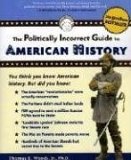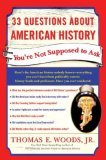33 Questions
What could possibly rival a good, long economics rant in terms of yawn-inducement? Paint drying? Grass growing? Paris Hilton?
Nope. It's an astrophysics lecture. I mean, come ON! All math, no theory; just plug in the numbers and launch the rocket already! Open the book the night before the final, memorize the formulas and presto: you've got a B.
In close second comes a history lecture. It's not the subject matter; history has a certain [voyeuristic?] allure where you get points for the details and for discovering the nasty secrets of dead people who can't spin the conversation. Nevertheless, most history profs have a way of taking a fascinating subject and turning it into a torture session.
When a historian starts speaking, I immediately flash to the scene in Mrs. Doubtfire where William Newman drones on about ornithischia.
One historian, though, has captured my attention for the past couple of years. He's got a way of parsing out the important details of an historical event, teasing you with the most interesting tidbits, and then leaving you with a never-ending stream of source material. Not surprisingly, this makes Thomas E. Woods, Jr. the envy of historians who don't understand why people sleep through their lectures.
 More importantly to Professor Woods, however, they are also envious of his books. They are written as he speaks: more information than you could possibly want to know presented in a way that leaves you wanting more. Unable to compete with him for eyeballs and attention spans, the history-trolls attack him in reviews without offering any contradiction to his work.
More importantly to Professor Woods, however, they are also envious of his books. They are written as he speaks: more information than you could possibly want to know presented in a way that leaves you wanting more. Unable to compete with him for eyeballs and attention spans, the history-trolls attack him in reviews without offering any contradiction to his work.
You know the best reads, music, and movies are the ones most castigated by the New York Times. Woods' book, The Politically Incorrect Guide to American History, was definitely targeted by the Times and, yes, it's great. (I gave a copy of it to my mother-in-law for Christmas, and I love my mother-in-law!)
So, I got a little excited this morning when I received an e-mail reminding me that today is the official release of Woods' latest book, 33 Questions About American History You're Not Supposed to Ask. From everything I've read, Woods wrote this book just to poke sticks at the history-trolls. Here's an example:
 Seems pretty tame, but watch the book reviews over the next few weeks. The more vicious the attacks are, the more you know you want to read this book.
Seems pretty tame, but watch the book reviews over the next few weeks. The more vicious the attacks are, the more you know you want to read this book.
UPDATE: Thomas Woods on WHO's "Mickelson in the Morning".
Nope. It's an astrophysics lecture. I mean, come ON! All math, no theory; just plug in the numbers and launch the rocket already! Open the book the night before the final, memorize the formulas and presto: you've got a B.
In close second comes a history lecture. It's not the subject matter; history has a certain [voyeuristic?] allure where you get points for the details and for discovering the nasty secrets of dead people who can't spin the conversation. Nevertheless, most history profs have a way of taking a fascinating subject and turning it into a torture session.
When a historian starts speaking, I immediately flash to the scene in Mrs. Doubtfire where William Newman drones on about ornithischia.
One historian, though, has captured my attention for the past couple of years. He's got a way of parsing out the important details of an historical event, teasing you with the most interesting tidbits, and then leaving you with a never-ending stream of source material. Not surprisingly, this makes Thomas E. Woods, Jr. the envy of historians who don't understand why people sleep through their lectures.
 More importantly to Professor Woods, however, they are also envious of his books. They are written as he speaks: more information than you could possibly want to know presented in a way that leaves you wanting more. Unable to compete with him for eyeballs and attention spans, the history-trolls attack him in reviews without offering any contradiction to his work.
More importantly to Professor Woods, however, they are also envious of his books. They are written as he speaks: more information than you could possibly want to know presented in a way that leaves you wanting more. Unable to compete with him for eyeballs and attention spans, the history-trolls attack him in reviews without offering any contradiction to his work.You know the best reads, music, and movies are the ones most castigated by the New York Times. Woods' book, The Politically Incorrect Guide to American History, was definitely targeted by the Times and, yes, it's great. (I gave a copy of it to my mother-in-law for Christmas, and I love my mother-in-law!)
So, I got a little excited this morning when I received an e-mail reminding me that today is the official release of Woods' latest book, 33 Questions About American History You're Not Supposed to Ask. From everything I've read, Woods wrote this book just to poke sticks at the history-trolls. Here's an example:
How wild was the "wild" West?
The standard story there, seared into the American consciousness and folklore by motion pictures and other tall tales, is one of constant chaos and peril. But historians have been rejecting that old view for some time. In fact, implausible as this may sound, what is most impressive about the old West was how peaceful and cooperative it was. Although you'd never know it, scholars have repeatedly shown that the old West was actually safer than most American cities today.
In the absence of formal government, voluntary institutions emerged that defined and enforced property rights and adjudicated disputes. Far from a land of lawlessness and violence, a myth spun from tales designed to sell dime novels, the old West actually constitutes a fascinating case study of the ability of market institutions, even in apparently impossible conditions, to facilitate peaceful interaction and to carry out functions we normally associate with government.
The story is all the more impressive when we recall the inauspicious circumstances in which these events occurred. The settlers were men of vastly different backgrounds. They had no intention of putting down permanent roots; they intended to make their fortune and return back home. They were complete strangers with no pre-existing community camaraderie on which to build. And yet, according to Andrew Morriss of Case Western Reserve University School of Law, "This amazing polyglot of men seeking rapid wealth, and with virtually no intention of building a lasting society, created a set of customary legal institutions which not only flourished in California but successfully adapted to conditions across the West."
 Seems pretty tame, but watch the book reviews over the next few weeks. The more vicious the attacks are, the more you know you want to read this book.
Seems pretty tame, but watch the book reviews over the next few weeks. The more vicious the attacks are, the more you know you want to read this book.UPDATE: Thomas Woods on WHO's "Mickelson in the Morning".
Labels: 33 Questions About American History You're Not Supposed to Ask, astrophysics, economics, history, Paris Hilton, Thomas E. Woods, Tom Woods


0 Comments:
Post a Comment
<< Home